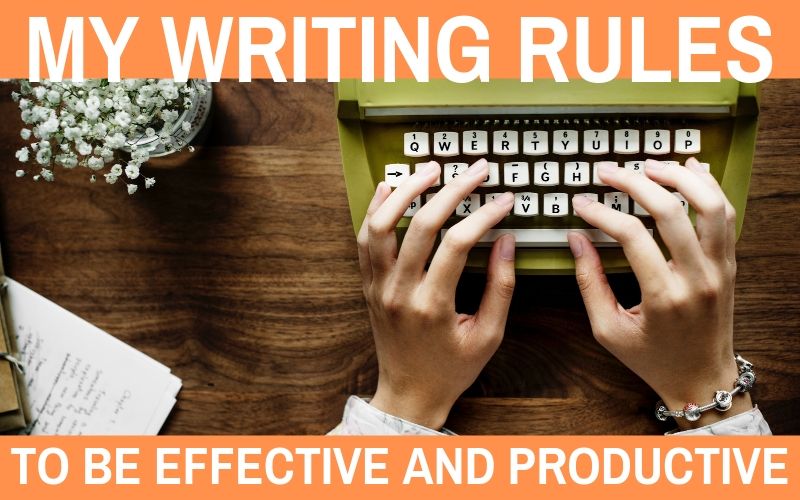Latest Writing Video! |
|
Every writer has their personal rules that help them strengthen their writing style. These rules not only reinforce their way of writing, but push them to improve their writing as well. If you are sincere about improving your writing, you will start developing your own rules as well. If you don't know what rules to set yourself, I am going to share my writing rules with you so you can get an idea. Let's jump into it! Write a 1000 words every day - at least 1000Before we get into the nitty-gritty of rules that improve flow of writing, let's discuss word count. Word count is what keeps the healthy habit of writing daily in my life. I find that stopping and avoiding writing only worsens my flow of writing. I am not so forgetful, but if I take too long a break it seems I forget how to write altogether. Sporadic writing is damaging to your write, be it an article or a novel. With that in mind, I stay productive and write as often as I can. Writing a thousand words a day ensures that I keep my business flowing as well. In this way, the world keeps turning and I with it. If I start to slow down, so does my productivity. With that in mind, a thousand words a day is nothing. Whenever I wish to write more, I can. A thousand words a day is a small word count for me. I will continue a novel, write an article or a short story. Everything and anything that there is to be written can be written. So, that's exactly what I do. Avoid 'said'I bring this rule up every time I find it fits an article. Using the word 'said' is not the end of the world, but I can do better. With that in mind, I opened my mind to the wide array of words out there that I could use. Grunted, moaned, screamed, yelled, pleaded, cried, murmured, whispered, blustered, bleated, barked, burped etc. So many wonderful words that can be used to add character to the speaker. With that in mind, I take advantage of dialog to add to my characters. I make them weaker or stronger through the way they speak. Such a wonderful technique is destroyed when you use words like 'said' and even 'asked. I like to think of this as a basic rule now, so if you haven't tried it, I recommend you do. New Paragraph Every Point or at 50-ish WordsA rule that isn't so complicated either. Knowing when to start a new paragraph is important no matter what you are writing. It keeps your writing punchy if you start a new paragraph at the right time. In this way, you not only space out your ideas and descriptions, but you add better flow to your writing. On top of that, you avoid the trap that novice writers make every day. Long paragraphs that go on and on until the reader gives up or the writer does. Keep your writing neat by starting a new paragraph every time you make a new point. Or, if your point is so large, every fifty-ish words. It looks a lot better and is far more enjoyable to read as well. Listing Chapters or Points Before StartingIt all comes down to planning. Whether is is a book or an article, knowing what you will write about next is essential. Having a plan ensures that you avoid dead ends, at least avoid most of them. The same would apply to articles, to ensure that what your plan on writing about has enough content. Even writing this article, I wrote a list of rules before I better explained to them. Rather meta to mention that, but it also reinforces this writing rule. Whether you are a novelist or blogger, planning will be a great boon at the end of a day. When it comes to books, I have to plan everything out. Some writers claim they can jump into writing a novel without a plan. Yet, these are the same writers who take several years to write a hundred-thousand word novel of chaos. To boost productivity, plan your story out. If it is fiction or nonfiction, decide on your chapters and what they will contain. Once you have done that, it all comes down to your creative brilliance to add the content. Proper planning goes a long way, ensuring you get results sooner, not to mention up the quality as well. Add Variety to Your WritingI love to experiment with different genres for various reasons. By working with different genres, not only do I improve my perspective, but I keep my interest in writing. Variety is the spice of life, so I found it necessary to give my writing life as well. I write a short story every day, a different theme each time depending on how on my feelings. The result is wonderful. On the day of writing this article I have completed three hundred short stories of all genres. At least, all the genres I wish to write at some point. From action to adventure, horror to romance, I ensure I never get bored of my work. Not only that, it forces me to go the extra mile and research writing every day as well. I'm sure that many of your reading this have no interest in writing a short story every day. Yet, I do believe that whether you are a blogger of novelist, you can fit variety into your work. Writers, such as yourself, are creative people who wish to make something great. What is wonderful about this work is that you can convey any emotion in any way you wish. Write For Yourself, Never PanderAn important rule to remember throughout your writing. Once more, if you are writing fiction or non-fiction this applies. If you are a fiction writer, your story should go the way you want it to. There are many times in the past I felt a story should go a certain way to make it a more mainstream read. Yet, knowing better, I wrote the story in a direction that I wanted it to go. A way that made sense and was satisfying to me, nobody else. Yet, there were many people who enjoyed the way it went. Thus, I knew I did the right thing. The story was much better written the way I wanted it to be written. The quality greater than it would have been if I decided to pander to the general public. It is this rule that I force myself to remember at all times. With nonfiction, you will need to teach what you know to your past self. If you approach the general public, you will find your work lacking. Yet, if you put yourself in your own shoes in a past time, you find the questions that need to be answered. The quality of your books will be outstanding. Never Force Your CharactersOf course this rule applies to fiction writers. You cannot force your characters on a path. Despite all my best planning for some books and stories, I realized some flaws. The characters would not realistically make such decisions as I needed them to. I will admit this can come down to poor planning, something I have done many times in the past. At least I avoid such mistakes more often than not. Yet, there are times when these dead-ends are unavoidable. In which case, you as a writer must decide on one of two courses of action. Salvage your story to go the way you want or see where the story takes you. Sometimes when you're in the middle of writing you can see a different path to the one you planned. The path can take your readers on a different story, or a different ending. You will be surprised how this can also result in a better story as well. In which case, it may come down to re-planning the novel from there onwards or seeing where the story leads. Yet, if you wish to, you can salvage your story. You change certain scenes or even start over if that seems like a good idea. Even this is a better alternative to forcing your character. It breaks the scene, it breaks the immersion for your reader as well. Take it from me, having disappointed myself with some stories, this rule is vital. Know When to StopMuch like any artist, a writer must know when to stop writing. I made this the final rule because this applies to all my work. I stop after a moment in my planning, knowing when a story must end. I have made this point the last because it is the point I decided to stop as well. Whether it is a short story, an article or even a long novel, know when it is time to end. On that point, I will end it here. I hope you found this article helpful and interesting. We are all in the same boat, writers looking to improve and create masterful works. Develop your personal writing rules and if any of mine appeal to you, you are welcome to use them. Happy writing! Thank YouDear Writer, Thank you for finishing this article. I had a lot of fun writing it and I hope you truly enjoyed it. There are many things you will learn from the writing experience and the 150 above are only a few. As a big thank you I would like to offer you something for FREE! A writing course on how to improve your main character! Click here to check it out your course. In addition, if would like to receive more content, bonuses and some big discounts on future courses, join the writers group here. Pin for Later!
0 Comments
Leave a Reply. |







